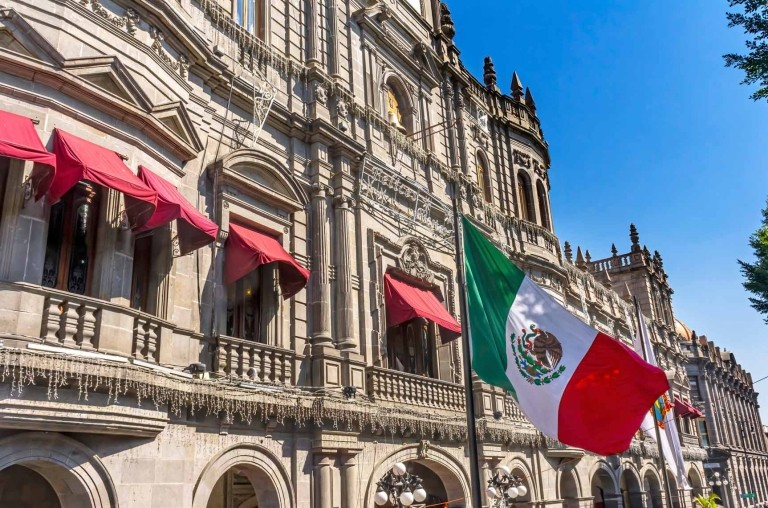What is an employer of record in Mexico?
An employer of record (EOR) in Mexico is a strategic partner that serves as the legal employer of your employees living in Mexico. An EOR assumes all employment duties and liabilities on your behalf, managing payroll, benefits, taxes, and compliance. Partnering with an EOR allows you to hire employees in Mexico without the burden of setting up a local entity in Mexico or navigating intricate labor laws.
Employment Guide to Hiring in Mexico
Explore the topics below to learn everything you need to know about hiring employees in Mexico.
Hiring in Mexico
Employment agreements in Mexico
In Mexico, a written employment agreement, signed by both employer and employee, is mandatory by law. Employment agreements must include the following information:
- Personal information of the employer and employee
- Employment duration
- Probationary period, if applicable
- Training and instruction provisions
- Employee’s duties
- Place of work
- Work schedule
- Salary
- Employment benefits
- Any other terms agreed between employer and employee
- Employee’s beneficiaries, in case of employee’s death
Probationary periods Mexico
There is no requirement for a probationary period in Mexico. However, initial training periods must not exceed 90 days for employees. Probationary periods cannot extend beyond 30 days for indefinite-term employment contracts or employment exceeding 180 days. Additionally, initial training periods of up to 180 days can take place for leadership or management positions.
Average working hours in Mexico
A standard workweek for Mexican employees is 48 hours, with 40% of Mexicans working six days per week.
How an employer of record helps you hire in Mexico
An employer of record (EOR) allows you to hire in Mexico without the headache of setting up a legal entity in Mexico. Because most companies don’t have the resources or extensive knowledge to compliantly hire in international markets, an EOR helps you engage top talent from anywhere and support them based on their local needs.
As an industry-leading EOR in Mexico, Velocity Global is a trusted partner in hiring in Mexico. By acting as the legal employer, we hire your new team members through local, compliant employment contracts—and you get back the time and flexibility to focus on your growing business.
Get expert help with hiring in Mexico
We're ready to guide you with global hiring, payroll, benefits, international workforce compliance, plus pricing information.

Payroll in Mexico
Payroll cycles in Mexico
Mexican labor law allows for both biweekly and monthly payroll cycles. However, a biweekly payroll cycle is most common in the country.
Wages in Mexico
Mexico’s National Minimum Wage Commission (CONASAMI) raised the general minimum wage in Mexico (salario minimo) on January 1, 2022 to 172.87 pesos per workday.
CONASAMI raised the 2022 Northern Border Zone (NBZ) wage to 260.34 pesos per workday. The NBZ is a set of 43 municipalities in Mexico’s northern states bordering the United States.
Bonus payments in Mexico
Article 87 of Mexico’s federal labor law states that all employees in Mexico are entitled to an annual bonus. The bonus is known as an aguinaldo and must be paid by December 20, giving it the nickname of a Christmas bonus. Aguinaldo is separate from vacation pay, equivalent to 15 days of wages for all employees with one year or more of service.
How an EOR helps you run payroll Mexico
An employer of record (EOR) in Mexico helps you compliantly manage your global team payroll, ensuring consistent and accurate pay and tax withholdings for employees living in Mexico. Think of an EOR as your international HR team that understands the complex labor laws and payroll regulations of different markets.
Partnering with a trusted EOR partner like Velocity Global for global payroll administration in Mexico offers numerous benefits, like access to a centralized platform for payroll data and reporting, secure data privacy and protection, and time and cost savings.
Taxes in Mexico
Tax due dates in Mexico
In Mexico, the annual tax deadline is April 30 for individuals and March 31 for businesses.
Tax thresholds in Mexico
Individuals are considered Mexican tax residents if they have established a residence in the country, regardless of the number of days spent in Mexico.
Mexican residents pay Mexican income tax on their worldwide income. Non-residents are taxed only on their Mexican-sourced income.
As of 2022, the Mexican income tax brackets are:
- Up to MXN 7,735.00: 1.92%
- MXN 7,735.01 – MXN 65,651.07: 6.4%
- MXN 65,651.08 – MXN 115,375.90: 10.88%
- MXN 115,375.91 – MXN 134,119.41: 16%
- MXN 134,119.42 – MXN 160,577.65: 17.92%
- MXN 160,577.66 – MXN 323,862.00: 21.36%
- MXN 323,862.01 – MXN 510,451.00: 23.52%
- MXN 510,451.01 – MXN 974,535.03: 30%
- MXN 974,535.04 – MXN 1,299,380.04: 32%
- MXN 1,299,380.05 – MXN 3,898,140.12: 34%
- Above MXN 3,898,140.12: 35%
The corporate income tax rate in Mexico is 30%.
Health insurance in Mexico
Mexico enjoys an efficient healthcare system consisting of public and private schemes. The majority of Mexican hospitals are internationally recognized as high quality and staffed by expertly trained medical personnel. Mexico has universal health coverage, and its public healthcare is used by most of the country’s residents. Mexico’s public healthcare is administered through the Instituto Mexicano de Seguro Social (IMSS); this covers patients for most health services and prescription medications. Employed residents are automatically enrolled in the IMSS system, and their contributions to the scheme are deducted by their employer. Although public healthcare in Mexico is relatively high, service quality differs between hospitals, and residents may experience long waiting periods for non-emergency procedures.
Pension in Mexico
According to Mexico employment law, employees in Mexico are subject to eligibility requirements for the state’s old-age retirement pension. Qualifying conditions for the state’s old-age pension include being at least 65 years old and submitting at least 1,250 weeks of contributions to the IMSS. The legal monthly minimum for the old-age retirement pension is 3,123.18 pesos.
How an EOR helps you calculate taxes in Mexico
Payroll taxes are taxes imposed on employers and employees. They vary between countries, making compliance a hurdle for businesses that may not have the expertise or resources to navigate payroll taxes in Mexico.
As an employer of record (EOR) with a tenured global footprint, Velocity Global is knowledgeable in handling all aspects of payroll for you, including calculating and filing payroll taxes, withholding and remitting taxes, and issuing tax forms in Mexico.
Calculate payroll contributions in Mexico
Leave Entitlements in Mexico
Annual leave in Mexico
Mexican federal labor law guarantees employees annual paid leave dependent on the employee’s length of service. The statutory minimum amount of annual leave days are as follows:
- After one year of service, six days of annual leave
- After two years of service, eight days of annual leave
- After three years of service, 10 days of annual leave
- After four years of service, 12 days of annual leave
- After the fourth year of service, an employee’s annual leave entitlement increases by two days for every four years of service
On top of their regular wages, employees are entitled to a vacation premium. This premium is 25% of their salary, payable during the leave’s duration.
Parental leave in Mexico
Article 170 of Mexico’s federal labor law provides the right of working mothers to a paid maternity leave of six weeks before and six weeks after childbirth. Mothers are also entitled to additional resting breaks during the nursing period, six months after childbirth.
Paternity leave in Mexico consists of five days’ paid leave, including in the event of adoption. A new mother is entitled to six weeks of maternity leave in Mexico in the case of adoption.
Sick leave in Mexico
The Mexican federal labor code designates a maximum of 52 weeks of leave in the case of illness or injury. The illness or injury must be certified by medical authorities of Mexico’s national Social Security system, the Instituto Mexicano del Seguro Social (IMSS), for paid time off to apply. IMSS pays employees 60% of their regular wages beginning from the fourth day of their absence.
Regional and national holidays in Mexico
Mexico has seven public holidays in a calendar year, which are not included in the minimum paid leave entitlement, and they are taken in addition to annual leave. The following are national holidays in Mexico:
- New Year’s Day (January 1)
- Constitution Day (February, the specific day fluctuates each year)
- Benito Juarez Day (March, the specific day fluctuates each year)
- Labor Day (May 1)
- Independence Day (September 16)
- Revolution Day (November, the specific day fluctuates each year)
- Christmas Day (December 25)
How an EOR helps you manage leave and PTO in Mexico
An employer of record (EOR) supports companies by managing annual leave, paid time off (PTO), and even local holidays all over the world—including Mexico. When it comes to handling a company's annual leave requirements, an EOR ensures compliance with local labor laws in Mexico at every step.
Some EOR partners, like Velocity Global, provide a platform that helps you oversee employee time off in Mexico. By outsourcing leave and time-off management to Velocity Global, you can ensure accurate tracking, compliance, and seamless administration, freeing up valuable time and resources for other business priorities.
We’re here to help you hire in Mexico
Get expert guidance with global hiring, payroll, benefits, and compliance.

Employment Benefits in Mexico
Federal benefits in Mexico
Mexico’s government benefits programs are administered by the Mexican Social Security Institute, Instituto Mexicano del Seguro Social (IMSS). The IMSS was founded in 1943, and it’s responsible for providing social security services to Mexican society. It collects contributions from employers and employees to maintain the Mexican Social Security scheme, which maintains pensions, survivor benefits, short-term disability, long-term disability, healthcare, and paid leave entitlements.
Supplemental benefits in Mexico
Supplemental benefits are additional benefits an employer in Mexico provides to enhance their employees' insurance coverage and overall compensation. Common supplemental benefits in Mexico include:
- Health insurance
- Life insurance
- Savings funds
- Transportation benefits
- Productivity bonuses
- Food vouchers
Given the inconsistent quality of care within the public healthcare system, employees in Mexico desire private healthcare options. Therefore, nearly all local and multinational employers in Mexico offer supplemental medical and life benefits.
Savings funds allow employers to withhold a portion of their employees' salary in a dedicated account for retirement, real estate, education, and other purposes. Often, employers match their employees' contributions up to a specified percentage of their earnings.
Some employers in Mexico provide transportation benefits, like fixed cash, gasoline vouchers, or shuttles, to assist employees in getting to work. Free parking is desirable for employees who own cars because parking is expensive in urban areas.
Productivity bonuses are a win-win for employees and employers in Mexico. These appeal to employees because they aren't considered income tax—they're tax-free, additional income.
Food vouchers for groceries, medicine, and other essentials are offered via reloadable chip cards similar to debit cards. Companies can deduct food vouchers from the company's taxes as a business expense.
How an EOR helps you administer benefits in Mexico
As the legal employer for your employees living in Mexico, an employer of record (EOR) administers statutory benefits and ensures they are enrolled and contributing to the appropriate government benefits. Additionally, an EOR partner manages the administration of supplemental benefits, including ensuring employees in Mexico receive tailored, expert-vetted, and competitive supplemental benefits packages.
Velocity Global makes understanding foreign statutory and supplemental benefits easy and offers your workforce competitive benefits packages tailored specifically to Mexico and beyond.
Terminations in Mexico
Notice periods in Mexico
There is no legal obligation in Mexico for employers or employees to notify the other in advance of termination or resignation. Notice periods can only be legally enforced if both employer and employee agree in advance. However, this is uncommon.
Instead of a notice period, employees who are terminated for reasons other than gross misconduct are entitled to a severance payment of three months’ wages.
Severance pay in Mexico
Employees terminated without cause are entitled to severance payments in all of the amounts described below:
- 90 days of wages
- 20 days of wages for each year of service
- 12 days of wages for each year of service, where the wage is capped at twice the amount of the daily minimum wage
- Any accrued wages and benefits such as paid leave, leave premium, and Christmas bonus
How an EOR helps you process terminations in Mexico
An employer of record (EOR) is responsible for processing terminations in the event you need to terminate an employee in Mexico. This may include adhering to local labor laws and regulations regarding termination procedures, including notice periods, severance pay, and any other statutory requirements.
As an EOR with experience in terminations, Velocity Global helps businesses minimize the risk of legal disputes or liabilities in Mexico.
FAQ
-
How does Velocity Global’s EOR help businesses expand into Mexico?
An experienced employer of record (EOR) partner like Velocity Global makes it easy for companies to quickly and compliantly build and support distributed teams in Mexico without the time and effort of establishing an entity. Velocity Global hires, pays, and manages your team in Mexico on your behalf, allowing you to quickly engage talent without setting up local entities or worrying about violating local employment regulations. Partnering with an EOR in Mexico is ideal for companies that want to convert contractors in Mexico to employees, streamline mergers or acquisitions, or simply test the Mexico market before making a long-term investment.
-
Can I hire in Mexico without an employer of record?
Yes. There are two options available for hiring in Mexico without an employer of record (EOR): establishing a local entity or engaging contractors in Mexico.
Establishing an entity in Mexico allows you to create a local branch or subsidiary, giving your company full autonomy over hiring and onboarding. This is a good option if you plan to hire a large team or establish a long-term presence in Mexico.
However, entity establishment is a costly and time-consuming process. It requires in-country expertise with local employment and tax regulations and can delay your ability to hire talent in Mexico for many months. If you're not prepared for long-term investments in Mexico or intend to hire a small team, setting up an entity can often be more trouble than it's worth.
Hiring contractors is a flexible, affordable alternative to hiring employees in Mexico, though it involves unique misclassification risks.
-
How are employees and contractors classified in Mexico?
In Mexico, employees and contractors are classified based on the determination of the employer-employee relationship. Mexico’s Supreme Court of Justice has stated it's the employer's legal right to control and direct, and the employee’s duty to obey the employer. Once an individual is hired as an employee, Mexican labor law applies to them in full.
Here are the factors used to determine the status of an employee in Mexico:
- Control over work processes and methods
- Degree of autonomy and independence
- Integration into the business operations
- Payment structure (salary, wages, benefits)
- Ownership of tools and equipment
- Degree of exclusivity in the relationship
-
What are the benefits and challenges of hiring in Mexico?
Mexico, the region’s second-largest economy, is among the 15 largest economies in the world and the leading exporter in Latin America. The World Economic Forum projects Mexico will be the world’s seventh-largest economy by 2050.
Mexico is a strategic international business partner with various commerce agreements and trade bloc partnerships. It has 13 free trade agreements with 50 countries; this includes USMCA, which substituted the North American Free Trade Agreement (NAFTA), supporting reciprocal trade between North American countries.
Mexico’s manufacturing produces $175 billion annually, with electronics, medical devices, and automotive sectors as the country’s leading industries. Additionally, the Mexican government passed a financial technology institutions law that promotes new fintech innovation and integration within the country, prompting positive responses from international fintech companies and investors.
However, there are challenges to hiring in Mexico. The country’s construction permits are difficult to obtain for companies constructing new offices. Obtaining permits and completing inspections are known to take a significant amount of time, and these processes notably give sticker shock to businesses.Companies anticipate a strenuous tax process in Mexico. There are specific tax reporting requirements per industry, and the approximately 240 hours necessary to correctly file taxes is laborious for businesses.
The Mexican economy is heavily dependent on the U.S. economy. Roughly 80% of Mexican exports are delivered to the U.S. alone, creating a risk of being highly susceptible to U.S. economic fluctuations.
-
What cultural nuances should businesses consider when hiring in Mexico?
The business structure in Mexico is usually hierarchical, where senior colleagues make decisions. It is common to greet with a handshake, use gendered titles, and address colleagues by their first surname since many Mexicans have two. Afterward, you may be invited to address them by their first name. If speaking in Spanish with your colleagues, use the formal “usted” conjugation instead of the informal “tu” conjugation to show respect.
Personal relationships are a crucial factor in Mexican business culture. Third-party introductions are often key to business success, as Mexicans value working with those they know and trust. There is a strong preference for face-to-face meetings and communication as much as possible instead of over the phone or virtually.



